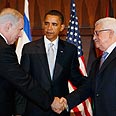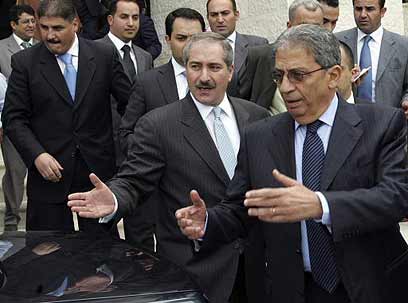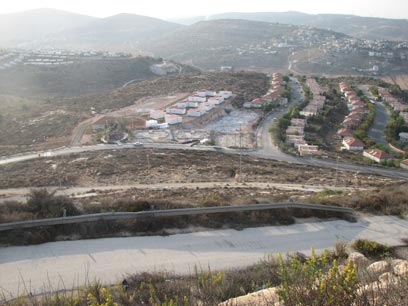
PA was informed in advance of settlement construction freeze
Ynet learns Israel, Palestinians conducting talks in secret so as not to draw criticism against Abbas, Fayyad; officials in Jerusalem estimate PA will announce return to negotiation table within a few weeks. Jordan says West Bank construction freeze 'insufficient'
Israel informed the Palestinian Authority (PA) in advance of its plan to announce a temporary construction freeze in the West Bank, Ynet learned Thursday.
Officials in Jerusalem estimated that within a few weeks the PA will declare its willingness to return to the negotiation table as part of an agreement reached between Israel and the Palestinian leadership in Ramallah.
The secret talks between Israel and the PA are conducted primarily by Defense Minister Ehud Barak and a number of other senior officials, mainly by phone. It was through this channel of communication that the PA was updated on the moratorium plan, which was officially announced by Prime Minister Benjamin Netanyahu Wednesday evening.
Barak is also in close contact with US Secretary of State Hillary Clinton regarding the possibility of further Israeli concessions to the Palestinians and additional measures aimed at jumpstarting the peace talks.
The talks are being held in secret so as not to weaken the status of Palestinian President Mahmoud Abbas and his prime minister, Salam Fayyad, in the eyes of the Palestinian public.
Abbas was harshly criticized recently for withdrawing the Palestinian demand that the UN Human Rights Council refer the Goldstone Report on Operation Cast Lead in Gaza to the Security Council.
Unilateral step 'insufficient'
Meanwhile, Jordanian Foreign Minister Nasser Judeh on Thursday called Israel’s unilateral step to partially halt settlement construction in the West Bank "insufficient," saying it did not meet the international community's prerequisites of a two-state solution.
"The sole outlet to ensure Mideast peace and stability is by re-launching serious negotiations that address permanent status issues such as borders, refugees and security," Judeh was quoted by the Jordan News Agency as saying.
Judeh reiterated Jordan’s stance, which rejects Israel’s attempts to "change the demographic status of Jerusalem."

Jordanian Foreign Minister Nasser Judeh (Photo: Reuters)
Also on Thursday, Israel's foreign minister shrugged off the Palestinian dismissal of the 10-month moratorium on some building in West Bank settlements, saying winning international support was more important.
"The last thing that should interest us is the Palestinians' concern. Before the Palestinian issue, what should interest us is our friends in the world," Avigdor Lieberman told Israel Radio. "We spoke to them and most said 'help us to help you'."
The announcement on Wednesday of the partial freeze was welcomed by the United States. It has been pressing Israel to limit settlement activities in the West Bank to coax Palestinians to renew peace negotiations stalled since December.
'The ball is in the Palestinian court'
But Prime Minister Netanyahu's decision, ratified by Lieberman, leader of the far-right Yisrael Beitenu party, and other members of Israel's security cabinet, fell short of Palestinian President Mahmoud Abbas' demands.Abbas has called for a full halt to settlement construction as a condition for reviving peace negotiations suspended since December. Netanyahu has rejected a complete cessation and Washington has said there should be no preconditions for talks.
Under Netanyahu's plan, no new residential building permits would be issued and no new residential construction could start for 10 months in the West Bank.
However, some 3,000 homes already approved or under construction would be completed during that time.
"The ball is in the Palestinian court," Lieberman said.
Abbas said the onus remained on Netanyahu.

Construction in Eli settlement
"The prime minister had to choose between peace and colonization, but unfortunately he chose colonization," the Palestinian president told reporters during a visit to Chile.
But French Foreign Minister Bernard Kouchner said in a statement the Israeli move was a "step in the right direction" and "a positive contribution to peace".
British Foreign Secretary David Miliband said his country wanted the Israeli decision to "become a step towards resuming meaningful negotiations". He called on Israel to implement a full freeze on settlements, which he deemed "illegal".
Palestinians wanted Jerusalem and its surrounding areas included in a freeze. They have voiced fears that Israeli settlements, built on land captured from Jordan in a 1967 war and occupied, would deny them a viable state.
Palestinian negotiator Saeb Erekat told Israel's Army Radio that Netanyahu's move was designed to deflect US pressure.
"At the end of the day, Netanyahu needs to make peace with us, the Palestinians, he doesn't need to make peace with Americans," Erekat said.
"If that's what he wants, that is his business. The last I know, Washington is 6,000 miles from Jerusalem, while Jericho (in the West Bank) is 67," he said.
Some 500,000 Israelis live in the West Bank and annexed areas around Jerusalem among 2.7 million Palestinians.
Reuters contributed to the report










